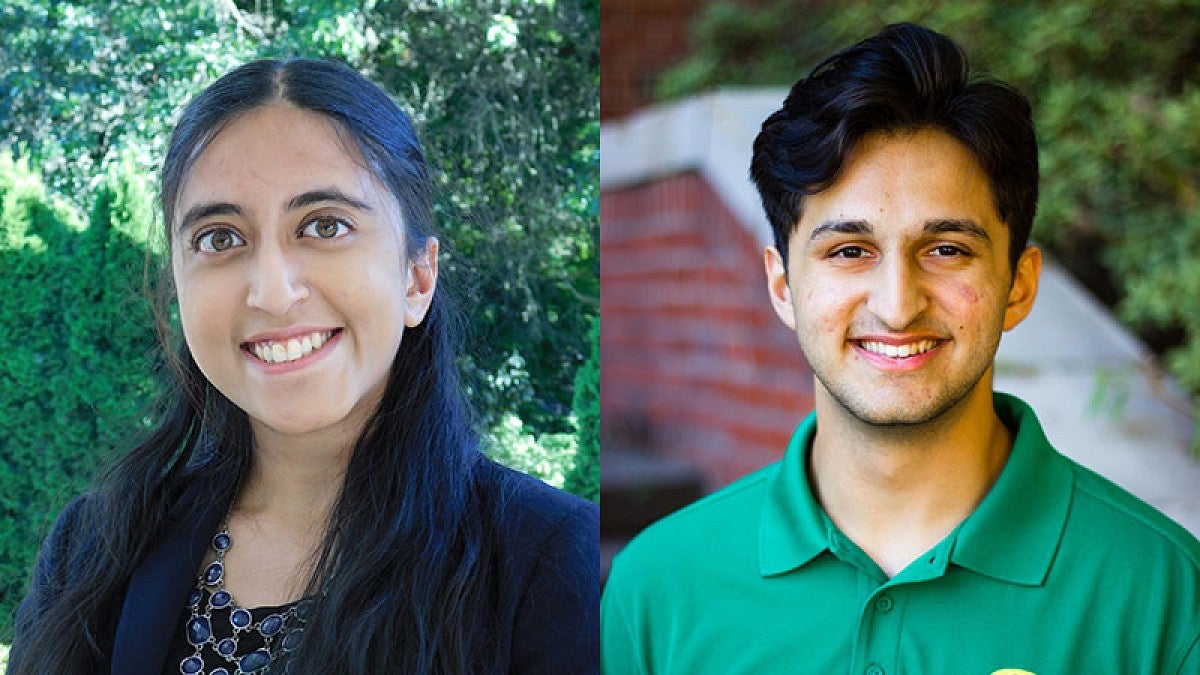One current University of Oregon student and another recently graduated Duck have been selected as finalists for the prestigious Rhodes scholarship.
Sumit Kapur, a senior majoring in political science and philosophy, and Sravya Tadepalli, a member of the Class of 2019 with a degree in political science and journalism, are among the candidates for the 2021 awards. Both are students of the Robert D. Clark Honors College.
“Jumping up and down with joy,” said the 20-year-old Kapur, describing his reaction to hearing the news late on a recent weekend.
“Insanely lucky and thankful,” said Tadepalli, who is 24 and works as a principal employment adviser at Community Services Consortium in Albany.
Kapur said he was at home with his parents in Tigard when he heard and woke them up. Tadepalli, who is from Corvallis, opted to first email the faculty members who wrote her recommendations and then broke the news to her family.
The Rhodes Trust awarded its first scholarships in 1902. Based at Oxford University in the United Kingdom, the organization sends 32 students from the U.S., and dozens more from around the world, to the historic university with full tuition paid. Finalists are asked to explain why they want to attend Oxford and what difference they aim to make in the world afterward.
The UO has had 19 Rhodes scholars in the institution’s history, the last one in 2007. The last finalist was Caitlyn Wong in 2017.
Kapur has his sights set on the Department of Politics and International Relations at Oxford, a preeminent forum for the study of applying political theory to social change, which he says is one of his passions.
“What I want to spend my life doing is dismantling systems of oppression on the basis of class, race, gender and ability,” Kapur said.
He wants to examine the roots of inequality in America, both in individual states and as an imperial power. Kapur is inspired by leaders like Representative-elect Cori Bush of Missouri, someone he feels can relate to constituents based on lived experiences of oppression and who calls out systemic oppression at the highest levels.
“In the arena of civil rights and liberties, I think that’s where all of the systemic inequalities become clear,” said Kapur, who wants to become a civil rights attorney. “We can figure out who these rights and liberties apply to. I want them to apply to everyone, and the institutions in our society don’t necessarily facilitate that.”
Tadepalli said she’s drawn to the international environment of the U.K. education system and, in particular, the culture of intellectual debate. She is applying for the public policy and global and imperial history programs, with the goal of studying foreign policy from a human rights and democratization perspective.
Her family legacy has put her on that path, she said.
“My great grandfather was a freedom fighter in India during the Quit India Movement,” she said. “He was a writer and activist and did a lot of direct action against British rule. He was sent to jail for four years for his actions.”
She remembers hearing about the war in Iraq in first grade. To her, it seemed no one was doing anything, so, following the example of the American Girl character Kit Kittredge, Tadepalli wrote a letter to the editor of her local paper. It was published and she realized she could have an impact on human rights.
“These issues that I thought were resolved are not resolved,” she realized. “History is now.”
Tadepalli said she would use the Oxford scholarship to prepare for work in foreign policy advocacy through nonprofit or published work. She is also driven to broaden international studies education beyond the Eurocentric perspective to a more global one.
“The students’ extraordinary academic research, civic engagement and advocacy work have already realized deeply meaningful impacts locally, nationally and internationally, and we are privileged to have them represent the UO,” said Kevin Hatfield, assistant vice provost for undergraduate research and distinguished scholarships. “To earn an invitation to interview is a truly singular accomplishment.”
The students spent a week in mock interviews with UO faculty members, which prepares them for a final Rhodes interview later this term. Even if they don’t win the scholarship, both said they value the opportunity to articulate their interests and goals.
“That little bit of validation is something so many people need,” Kapur said, “and it’s so helpful to know that this work that I’m doing, it’s work that’s worth doing.”
—By Anna Glavash Miller, University Communications


